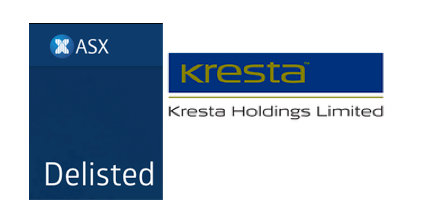

Kresta Holdings Limited has been delisted from the Australian Stock Exchange after placing its shares in suspension for over two years.
The company was officially delisted from the exchange at the commencement of trading on Wednesday, 16 September 2020. The Company’s securities had been suspended from the official list since 31 August 2018.
Under ASX’s policy as set out in guidance note 33, unless the Company’s securities could have been readmitted to trading or the Company had otherwise obtained an extension from ASX, its securities are automatically delisted two years following suspension.
“Whilst the Company has been working to explore avenues for the readmission of its securities, the Board has determined that in the current circumstances, it is better for Kresta to pursue its business and operations as a public unlisted company,” the company said in a statement.
“The Company will therefore be automatically delisted. The Board would like to take this opportunity to thank its shareholders for their support of the Company.”
Kresta had reported several years of large losses, and whilst its latest financial report showed it had stemmed its losses in the first half of 2020, its trading numbers were down 46% to $12,413,000 for the first half of 2020 (2019: $23,041,000).
The company attributed the fall to the outbreak of Covid-19 and sale of Curtain wonderland Pty Ltd at the end of December 2019. The Group recorded a net loss for the period of $128,000 which compared with a net loss after tax of $6,678,000 for the comparative period, however the loss was tempered by over $1.3M in Jobkeeper payments, plus rent reductions and payroll tax deferrals.
The company’s auditors Bentleys also indicated in the latest financial report that a material uncertainty exists that may cast significant doubt on the Group’s ability to continue as a going concern.
Kresta’s financial reports have also come under scrutiny from ASIC. In a release dated 17th September 2020 ASIC said that Kresta has decided to reduce the gain recognised on a sale and leaseback transaction by $997,000 in its financial report for the half-year ended 30 June 2020. ASIC had raised concerns on the amount of the gain on the sale and leaseback of a property under a new standard on lease accounting in the financial report for the year ended 31 December 2019.
“Asset values and lease accounting are focus areas for financial reporting at 30 June 2020. Where asset impairment or reduced performance is attributable in whole or part to significant factors not related to the COVID-19 pandemic, these factors should be disclosed and given appropriate prominence in addition to any significant COVID-19 factors,” ASIC said in the release.
“Directors are primarily responsible for the quality of an entity’s financial report. This includes ensuring that management produces quality financial information on a timely basis. Companies must have appropriate processes, records and analysis to support information in the financial report.”